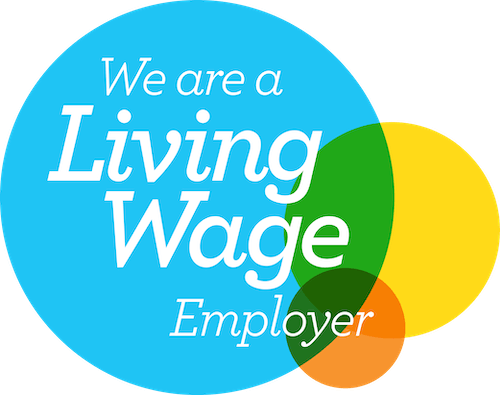Most days when I’m in the Studio Cotton shoffice here in central Bristol, you’ll find me clicking and tapping away, creating websites for small businesses.
But this blog post isn’t gonna be chocka with advice that will help you sell – instead I want to talk about the website features that stop me from buying.
As the owner of a web design company, I’d say I’m extra critical and cynical of other business’ websites.
I’m not chatting about colour choices or hover animations, or if they went with a rounded button over square ones, because so many of those choices are subjective. I won’t rule out a product or service because we have different aesthetics and vibes.
I am talking about that website as a reflection of organisation or person it represents.
It is my duty to protect my small business – Studio Cotton – which I do by making informed choices, and performing a nice dollop of due diligence before committing to a purchase.
That means if a business is throwing up all sorts of red flags – via their website or any other means – it’s my job to pay attention to those red flags and steer well clear.
Thing is, as someone who works with a tonne of small businesses, I also know that a lot of amazing people and bloomin’ brilliant organisations have website red flags, and don’t even realise.
I wanted to share my 7 website features that make me lose trust in a small business, for a couple reasons.
Firstly, I want to help wonderful people with accidental red flags take those fellas down right now.
More importantly, I want to help you with your due diligence. Maybe this article will save you from being sucked into a sales page or two, too.
Pssssst… this article isn’t going to talk about all the red-flag and unethical sales tactics often founding in website copy/working. If you want those, check out my previous article, 16 frighteningly popular sales tactics that work ghoulishly well (and might just be some bright, blood-red flags).
1. Hiding the price of thing that is being sold
I will never understand why hiding the price of a product or service is such a popular web design feature.
I’ve heard the logic that it:
- Builds intrigue
- Forces more people to get in touch
- Focuses the reader on the value, not the cost
And I disagree with it. So much of best practice website design and UX is about providing the most efficient user journey possible for the highest quantity of target customers.
This basically means making web design choices based on what’s most likely to work for most people – and most people want to know how much something costs as early as possible.
The conclusion I draw from a business that hides their pricing is that they want to force me onto a sales call. One where they can spend even more of my time convincing me I need to buy a thing, when I don’t even know that I have the budget for it.
Or, they want to get me into an email click funnel so they can send me 17 emails to convince me to do the same thing. I can promise you now, I will not open those emails. I’ll mark them as spam, and that’ll damage your sender reputation.
Pricing doesn’t need to be front and centre in a massive font, it just needs to be there. I took this into consideration when creating our web design service page; popping the price at the top couldn’t work, as we literally didn’t have the space for the variations at the top of the page.
I solved this with a neat lil ‘skip to pricing’ link, and a clear price list near the bottom at the natural conclusion of the content.
2. Lack of legals & company registration
Hidden pricing might not just be a web designer’s pet peeve – but I feel like this one might be more niche. As a small business, we all have at least a handful of laws and regulations with which we need to comply.
Products needs to reach safety guidelines, kitchens need to be hygienic, and invoices need a unique identification number. Just like products and kitchens and invoices have legal requirements, websites do too.
Here’s the obligatory I am not a lawyer and this isn’t legal advice caveat. Websites need a terms and conditions page, they need privacy policies, and they need to chat about cookies.
If a website represents a limited company registered with Companies House, I’d expect to find their registration details too.
When I’m checking out a new product or service supplier for Studio Cotton and I can see that they are not complying with laws around websites – I can’t help but think “What other regulations and process might they be skirting?”
It plants a conker of doubt, and makes me aware that any purchase with this small business has an element of punt around it. That might not matter too much for a £16 desk planner, but would probably rule out booking a £300 consultation.
3. Questionable cancellation & refund policies
Speaking of legals – I want to see a legally compliant cancellation and refund policy.
That doesn’t mean that I want to see a paragraph that reiterates my legal rights (which, to be honest, is much better than nothing), but I want to know exactly what your policy is around cancelling or refunding my purchase – and I want to make sure you’re adhering to those laws again.
For example, digital downloads have a specific category under the Consumer Contracts Regulations and are not classed as goods or services.
From the Which website; “Retailers mustn’t supply digital content, such as music or software downloads, within the 14 day cancellation period, unless the consumer has given their express consent to this happening.”
So when I see a small business selling downloadable stock photography or a PDF workbook without requiring their customers to acknowledge they are forfeiting their right to cancel – a lil red flag gets hoisted.
The Which article on the Consumers Contracts Regulations really is worth the read, so make sure to bookmark that bad boy if you haven’t already.
4. Lack of seller location
Just tell me where you’re to. I don’t need your home address (well, unless that is where your company is registered with Companies House), just a neat lil “Proudly based in London/The Cotswolds/Utrecht/Malé” is what I crave.
It’s not just for my own comfort, but also for practical reasons.
Let’s say that I am searching for a small business to cater the seventh birthday of Studio Cotton (because I love parties & previews as a marketing technique).
My preference would be to find someone from the Bristol area so that there’s a lower chance of them getting stuck in our legendarily horrendous traffic, and they’ll know how to navigate the city centre after it was literally cut in half a couple years back.
If I found the perfect person but they were from Bath or Weston-Super-Mare, I’d likely still get in touch, and just speak to them on the phone about how they’d handle the logistics.
But when I can’t find out where someone is from – even if their website says they offer private catering “across the West Country” – I’m not going to trust them as much as the competitor who just said where they are.
5. I can’t find the people (or why I should trust them)
Story time.
At least once a week I check our backlinks as part of our SEO tracking routine. Some time in 2021/2022 I found a new link from another small business, similar to Studio Cotton, with a huge crossover audience. It was in a blog article that was also about SEO.
I’m going to call the small business owner Ella, because that is her name.
Usually this find is a big whoop-whoop situation as it means I’ve just scored a sweet backlink from some mega relevant content and a shoutout in front of a new audience. Plus it strokes my ego, and my ego has a tremendous thirst.
I read Ella’s blog and couldn’t help but think “Wait a minute, I’ve read this before. In fact, I’m pretty sure I wrote some of it”.
And I had. Ella had copied a blog article from our website – Blogging SEO: 7 tweaks to optimise a blog for more Google searches – and just switched a few bits around.
Ella had ripped a whole heap of content from our website. Our blog, our service descriptions, nuggets from our home page – now on her website.
Every inch and every pixel on the topic of SEO on Ella’s website came from me; my brain, my expertise, and my business.
As my friends will vouch, I can get proper obsessive when I’m wronged – so whilst perusing Ella’s Instagram posts and awaiting a response to my sternly worded email, I spotted a post about her latest service.
A course about SEO.
Story conclusion: people can say all the right things, and still be naughty sausages.
That experience certainly left me even more cynical and jaded than I was, but finding the people behind a small business has always been important.
Especially if a small business is selling expertise-based product or service – I want to know who is holding that expertise, and where that expertise has come from.
I also want to know who’s gonna be at the other end of my emails if something goes wrong. I don’t need a life story, just a name, maybe a pic, and, like, 7 bullet points will usually do the job.
6. Unprofessional websites selling expensive, professional products
How often do you hear a professional web designer say that not every small business needs a professional website? Well open your ears* because I’m coming at ya.
Not every small business needs a professional website.
Small businesses can get further than ever with a DIY website, especially when they invest in growing their own knowledge and seek input from experts.
However, I would say that as a small business matures, they generally reach a point where outsourcing their website to a professional just makes the most sense. Have a read of this blog post to see if you’re there yet: 7 ways you’ll know it’s the right time to switch from a DIY website to a professional website.
It lightens their workload, and it can open new opportunities for both attracting and converting customers.
A professional website is an investment – at least a few thousand pounds – but it is generally a logical, inevitable, and, compared to other marketing channels, rather low-risk one.
But occasionally I’ll come across a low-quality or DIY website that is selling a high price-point product or service, and it just makes me quite wary.
If a small business is asking me to spend £627 on their 3-hour workshop (yep, real example), but have an untidy, cluttered, poorly-written, slow and just, well, unprofessional website – I take a step back, because this is getting flaggy.
It’s kinda like walking into a shop to buy a fancy green velvet sofa – but the shop has wine gums on the floor, you can’t walk around without bumping into footstools, and it kinda smells like feet.
Asking me to invest in a high-end service, when the business hasn’t invested in selling it to me, will immediately tear down that trust.
Even if they have the very best 3-hour workshop and/or fancy green velvet sofa.
*yeah, I know, this is a blog and you’re reading, not hearing it.
Thoughtfully crafted websites for lovely small businesses
Utterly splendid websites designed & built exclusively for small businesses (with all the bells and even more whistles).

7. Lack of impact awareness
Hands up if you’re trying your best to not make the world a worse place? I’m with you – and I want the small businesses I work with to be too.
Sustainability and inclusivity are really important at Studio Cotton and to me, so when a business pops one of those labels on themself – I want to know what they’re actually doing to be more sustainable and/or inclusive.
Talking-the-talk but not showing how you’ve walked-the-walk sparks a concern that you might be greenwashing. Or inclusive-washing (if that’s a real term).
And because I am that critical, cynical, sceptical, jaded small business owner – I tend to assume the worst.
I know, I know, that a tonne of small businesses are putting a tonne of effort into these areas. I also know that a lot don’t think they’re doing enough, which is why sustainability and inclusivity info doesn’t always make it onto a website.
Heck, I’ll put myself and Studio Cotton in that boat too.
But if you’re marketing your business as being inclusive and sustainable, earn my trust by showing me how you’ve earned those terms.
So those are my 7 website features that make me lose trust in a small business, check out Studio Cotton on Instagram for more bitesize small business advice – and drop me a DM with your website trust issues. I’m all ears.*
*eyes. Yeah, I did it again.
PS. Ella, if you’re reading this – I still check in on your website every few months because I don’t trust you not to steal our content again, so here’s a très sarcastic thank you for wasting freakin’ hours of my life. Ya naughty sausage.























